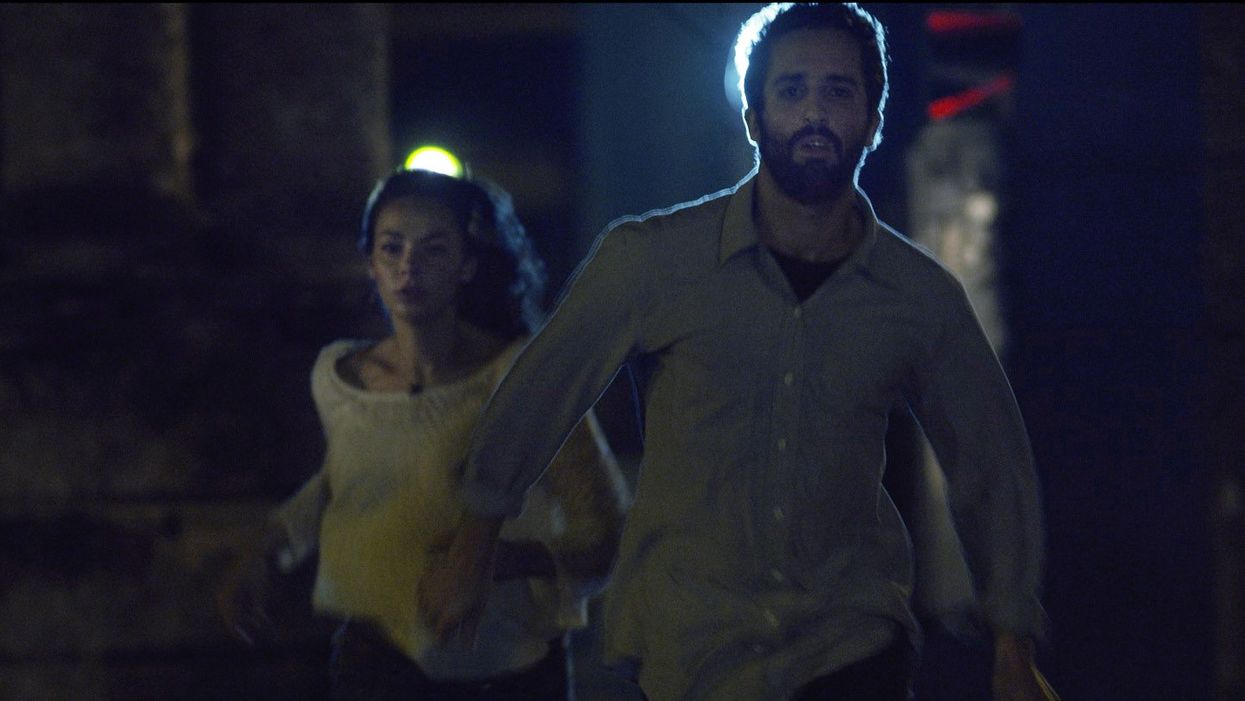Get Inside 'La Noche Buena': The First American Narrative Short Made in Cuba Since the Embargo
Making films is hard enough, but imagine crossing borders into embargoed territories, dealing with language barriers and dodging the U.S. Treasury.

Coming up on the one year anniversary of eased travel restrictions to Cuba, writer/director Alex Mallis releases La Noche Buena, a meditation on what it means to be a visitor in the first place.
Being a half-Cuban filmmaker based in New York, Alex Mallis has a unique perspective of the responsibility of being a guest in a foreign country. His heritage lead him to visit Cuba years ago, where the themes of La Noche Buena transpired. We chat with Alex about translating a personal experience into fiction, ducking the law, and the responsibilities of tourism.
NFS: I'm a freak for realism. I love just looking at the people milling about in the wide shots, in all of their unaware banality. This piece captured a place that I really hadn't seen before.
Alex: It's an uncommon place, it's a totally unique place. It's not third world, it's not first world. It defies expectations in many senses: the economic sense, the way the government is set up — it's actually a dictatorship — and the visual sense. The architecture of the city is Spanish Colonial but people like to say it's frozen in time, which is most visibly noticeable in the cars. Cuba has its own flavor and its own color and vibrancy — that was definitely something that attracted us to shooting there.
NFS: How long ago did the real event that inspired this story take place?
Alex: I grew up in New Hampshire — the opposite of Latino. I always felt very white, very removed from that culture that is half of me. So going to Cuba felt like that exploration, it's a shared phenomenon among a lot of Americans: coming to a point in your life where you become curious about where you came from. Often times when you go to a place for the first time you have this fairy tale image of what it might be like. But there's also the reality of every day life and the people who are there.

One of the biggest challenges of going back was not only gripping to that false nostalgia, but also the assumptions and responsibility I felt I had subconsciously as an American with means. The means to afford to travel to a place like Cuba where [some] people make $30 / month. Just knowing that I could probably afford to just give a person $1,000 and I would be fine, and that's like giving them $100,000. You can change their life. And whether it's giving them $1,000 or just paying for a cab, these questions are tough: what responsibilities do you have as a guest in someone's country? How should you act, what should you give, and the toughest question is: what is being asked of you?
The central question to translating any personal story into fiction is: how true to life are you going to keep it? There's so many moments packed into an experience, which ones are the most important?
NFS: How did you transpose the real event into something that would play as a story?
Alex: The central question to translating any personal story into fiction is: how true to life are you going to keep it? There's so many moments packed into an experience, which ones are the most important? Sometimes things that happen in real life don't serve a narrative, because really we're trying to boil it down to its essence. What is the idea that you're trying to do? The experience you had in real life may not be the most effective. It's a great foundation or jumping off point, and then you take that and throw it on the page. You have the liberty as a writer to change things, because you're making fiction.
NFS: How did you cast the film?
Alex: We cooperated with the Cuban Cinema Institute, and they got all the crew, permits and work visas, all the things that are required to shoot a narrative in a relatively closed country. For casting we worked with this matriarchal casting director — who is the casting director of Havana — all films go through this woman. She lives in this mansion in this beautiful spot in Havana, and she was the one through which we found our actors. It was really interesting, not only because we were seeing flat dialogue come to life through the mouth of an actual Cuban, but they all have stories that came from the themes of the film. It just reminded me that any time you're in a country dealing with tourists, these kinds of themes present themselves.
NFS: What was production like?
Alex: We wanted to do this right in the eyes of the Cubans. So we sent in our script, bios of cast and crew, submitted a budget. We had line producers, Cuban gaffers, Cuban sound guy, PAs, drivers, catering, we even have a Cuban police officer to shut down traffic because the cars were so fucking loud — and of course my amazing and talented NYC-based producer Marina Fernandez Ferri. So we were a real legit operation. We weren't hiding from anyone, we were shutting things down. We were all surprised at the level of professionalism. The gaffers we worked with in Cuba — despite the fact that they were working with three times refurbished Chinese lights — made them work so well. Super hardworking and efficient.
It was especially challenging because our (incredible) DP, Ed David doesn't speak Spanish and the gaffers don't speak English. So there was a lot of hand gesturing. It's a naturalistic feeling film but everything is super lit. We had a big crew, like 25 people or so on some of the big days. Castro and his regime have always supported the arts, of course to spread propaganda, but when all industry has been nationalized to the point where there are state funded films, directors, gaffers, sound people. Now there's even rental houses and a new generation of young filmmakers thanks to the DSLR revolution.
NFS: I imagine the crews are inexpensive?
Alex: It's super cheap to shoot in Cuba, but doing it legally requires approval from the Cuban government. You have to get your story approved through the Cinema institute. That's a giant pain in the ass that can take like a year. It's super opaque, email is not super common, there's no updates, it just doesn't work at the speed of New York. But once you get approved it's relatively cheap. The average day rate of crew there is somewhere between $30-$60 / day. But of course you have to get to Cuba, and flights are not super cheap. From Miami it's like $450 for a 90 minute flight.
When you make a film I think you have to decide what you want: Do you want accolade? Return on investment? Or eyeballs?
NFS: As a director shooting in a foreign place, what kind of things are you most sensitive to when you're looking at what to capture in the real world that's there?
Alex: So many of the themes of the film — responsibility, privilege, have and have-not — were being re-enacted every day on set just because we were the American filmmakers from New York and they were the Cuban filmmakers. And everyone was aware of it, that the theme we were exploring was playing out in real time as we were shooting. The real woman who the film was based on came to set to check it out. A bizarre moment came when she was leaving that day, we were saying goodbye and we walked to the corner and I said "Here's a couple bucks for a cab." And she said "No, I'm going to take the bus, it's okay." And we kinda looked at each other right before she walked away and we had this unspoken understanding that "Wow, we just did it again. The whole thing this film is about, we just did it again." It allowed us to have this moment of mutual understanding and respect. That was a real nice moment.

NFS: What are your plans for the film now?
Alex: We've been festivaling for about 6 months, we've had a great response. It's been awesome, it's been everything a festival run should be: It's been fun, we've met a lot of people, we lived the rockstar life for a brief moment. Next week we're going to the Havana International Film Festival. It's like the Sundance of the South, we don't hear much about it here because of the embargo. Short films are tough: what do you do with it after festivals? When you make a film I think you have to decide what you want: Do you want accolade? Return on investment? Or eyeballs? You kinda have to pick one and tailor your distribution strategy to that, and to a certain extent your production strategy. For me, I just want as many people to see it as possible. So the decision was obvious, we're gonna put it online for free.
NFS: Will you shoot again in Cuba despite all the challenges and the tricky legality?
Alex: It's such a logistical challenge to shoot in another country, it just seems like a miracle that anything works at all. A country that barely has internet, that is behind a U.S. embargo, what were we thinking? At the end of the day it's a minor miracle that we were able to pull it off at all. Everything comes with its own challenges, but this makes me really think now: "What can I make in my apartment?" [laughs]
I've gotten a lot of inquiries from filmmakers about how to shoot in Cuba and the first question I ask is: "Why Cuba?" Unless they can give me a really good answer, I'm trying to dissuade them. People are obsessed with this idea of getting to a place "before it changes" and to me that's the wrong approach. You write the story about the thing you can relate to and not the other way around. I'm all for making films in Cuba but there should be a reason. It's not easy to shoot in Cuba for all the reasons I named, but also — the process we went through was illegal. The biggest reason is that you have to get approval from the U.S. Treasury department. That was the one thing we didn't do. As it was and continues to be, there's 3 ways to go to Cuba: illegally through a third country, through the U.S. under a special license, or a general license which is what we did. It's all good to stick it to the man a little bit and do this anyways. We did get a letter from the U.S. Treasury Department that was a cautionary letter, a giant finger wagging. We got lucky, I guess.













